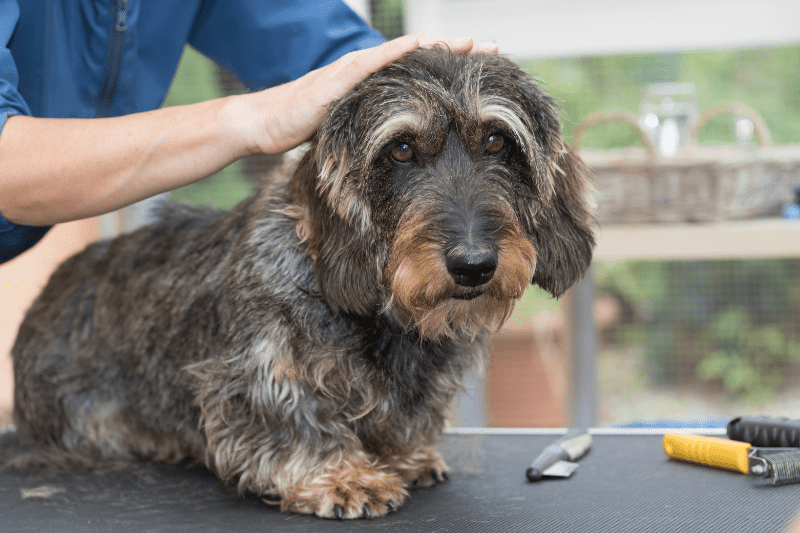Yes, dachshunds can be prone to allergies, just like many other dog breeds. Some common allergies in dachshunds include food allergies, environmental allergies (such as pollen, dust, and mold), and flea allergies.
Itching, skin irritation, ear infections, and even digestive troubles can all be signs of allergies in your dachshund. To ensure that your pup receives the best care possible, it’s critical to seek out a veterinarian for accurate assessment and proper treatment plans. With their help, you’ll be able to offer relief from those uncomfortable symptoms quickly!

Types of allergies in Dachshunds
Several types of allergies can affect dachshunds, including:
- Food allergies: These occur when a dachshund’s immune system reacts to a specific ingredient in its food. Common food allergens for dogs include beef, chicken, dairy, wheat, and soy.
- Environmental allergies: Also known as atopic dermatitis, these allergies are caused by environmental allergens such as pollen, mold, dust, and certain grasses. Symptoms may include itching, skin rashes, and ear infections.
- Flea allergies: Dachshunds can be highly sensitive to flea bites, and even a single flea can cause an allergic reaction. Symptoms may include intense itching, hair loss, and skin infections.
- Contact allergies: These occur when a dachshund’s skin comes into contact with an allergen, such as certain types of fabric, cleaning products, or plants. Symptoms may include itching, redness, and skin irritation.
If you suspect that your dachshund may suffer from allergies, it is best to consult your veterinarian for proper diagnosis and treatment. Your vet will be able to recommend the best lifestyle changes and treatments for managing or treating your pup’s allergies. With the right care, your dachshund can stay healthy and happy!
How to know if your Dachshund has allergies?
There are several signs that your dachshund may have allergies. Here are some common symptoms to look out for:
- Itching: Allergies in dachshunds often manifest as intense itching. Your dog may scratch, lick, or bite at their skin frequently, especially around their face, paws, and ears.
- Redness and inflammation: Allergies can cause your dachshund’s skin to become red, inflamed, and irritated. You may notice red or pink skin, hot spots, or scabs on your dog’s skin.
- Ear infections: Dachshunds with allergies are prone to ear infections, which can cause discomfort, itching, and discharge from the ears.
- Gastrointestinal issues: Some dogs with allergies may experience vomiting, diarrhea, or other digestive issues.
If you notice any of these symptoms in your dachshund, it’s important to take them to a veterinarian. The vet can perform tests to determine if your dog has allergies and recommend appropriate treatment options, which may include dietary changes, medication, or other interventions.
Related post: Dachshund Skin Allergies: Causes, Symptoms, and Treatment

How are dog allergies diagnosed?
Diagnosing dog allergies can be a complex process that involves several steps. Here are some of the most common methods that veterinarians use to diagnose allergies in dogs:
- Physical examination: A veterinarian will first examine your dog’s skin, coat, and ears to look for signs of allergies, such as redness, inflammation, or discharge.
- Medical history: Your vet will ask you about your dog’s medical history, including any past allergies, current medications, and recent changes in diet or environment.
- Allergy testing: Several types of allergy tests can be used to determine what specific allergens are causing your dog’s symptoms. These may include blood tests, skin tests, and elimination diets.
- Response to treatment: Sometimes, a veterinarian will diagnose allergies based on how your dog responds to treatment. If your dog’s symptoms improve with allergy medication or dietary changes, this can be a strong indication that they have an allergy.
- Elimination diet trials: Your dog will be put on a special diet that eliminates all potential allergens for a few months, and then gradually reintroduced one at a time to determine which food or ingredient is causing the allergic reaction.
Once your dog has been diagnosed with allergies, your vet may recommend a variety of treatment options, including medication, changes to their diet or environment, and other interventions. It’s important to follow your vet’s instructions carefully to manage your dog’s allergies and help them feel better.
Dachshund allergy treatment
There are several treatment options for dog allergies, depending on the type and severity of the allergy. Here are some common treatments for dog allergies:
- Medication: Antihistamines, corticosteroids, and other medications can be prescribed by a veterinarian to help relieve allergy symptoms, such as itching and inflammation. In some cases, immunotherapy may also be recommended to help desensitize your dog to specific allergens over time.
- Dietary changes: If your dog has a food allergy, your veterinarian may recommend a hypoallergenic diet or an elimination diet to identify and eliminate the allergen from their diet.
- Environmental management: If your dog has environmental allergies, such as allergies to pollen or dust, reducing their exposure to these allergens can help reduce symptoms. This may involve using air purifiers, keeping your home clean, and avoiding outdoor areas with high levels of allergens.
- Bathing and grooming: Regular bathing and grooming can help remove allergens from your dog’s skin and coat, which can help reduce itching and inflammation.
It’s important to work closely with your veterinarian to determine the best treatment options for your dog’s allergies. With proper management and care, most dogs with allergies can live healthy, happy lives.

Conclusion
In conclusion, Dachshunds can indeed be prone to allergies, and pet owners need to be aware of the signs and symptoms of allergies in their dogs. Consulting a veterinarian for proper diagnosis and treatment is crucial for effectively managing allergies.
Common allergens for dachshunds include environmental factors, such as pollen and dust, as well as food and contact allergies. Identifying the specific allergen is critical in managing allergies; therefore, veterinarians may use various diagnostic tools and tests to determine the cause.
In addition to medication, there are several home remedies and lifestyle changes that can help soothe your dog’s allergies, such as frequent bathing and switching to a balanced diet. Speaking with your veterinarian about the best food options for your dachshund with allergies is also essential.
Related post: Understanding Dachshund Allergies
Recent Posts
Calculate the perfect food portions for your dachshund with our specialized calculator. Get customized feeding recommendations based on size, age, and activity level to support your wiener dog's back...
Looking for the perfect gift for a proud dachshund mom? We’ve rounded up the cutest dachshund shirts that celebrate your love for wiener dogs in style. Whether you’re shopping for yourself or a...


